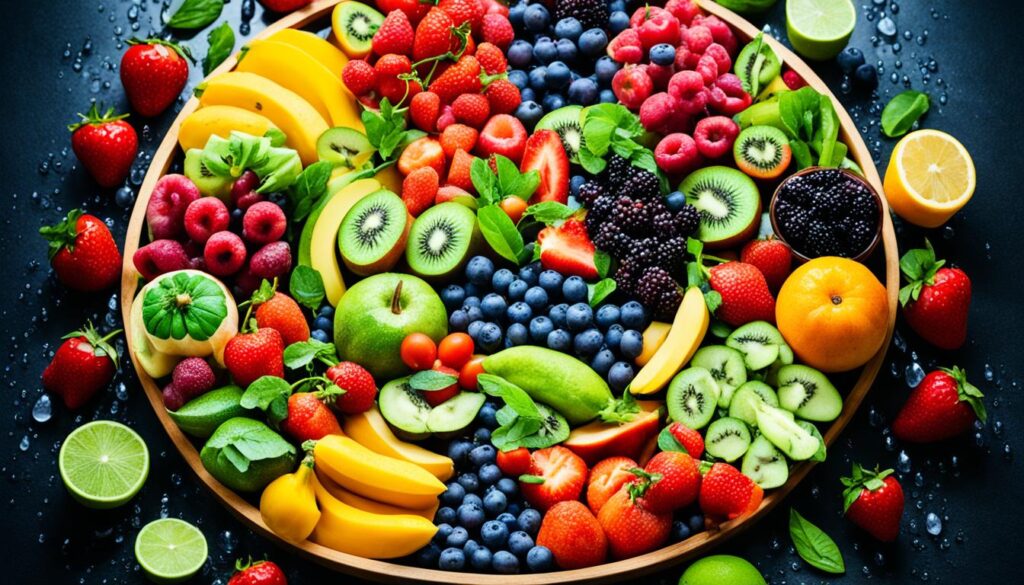During Ramadan, Muslims fast from dawn to dusk worldwide. It’s key to keep hydrated for energy1. Sangeeta Tiwari points out the need for a nutritious pre-dawn meal. This meal, known as Suhour, helps the body to handle the fast well and stay hydrated1. In places like the Middle East, where temperatures can spike to 40 degrees Celsius, drinking enough water is crucial1.
Eating a mix of carbs, proteins, fats, fruits, and veggies at Suhour is important. This variety keeps your body nourished through the day1. Seeking advice from skilled dieticians can offer tailored tips to stay hydrated while fasting. This knowledge improves your fasting experience, enhancing spiritual reflection and well-being during Ramadan. These tips will guide you in staying vibrant through your fasting hours.
Key Takeaways
- Observe hydration strategies during fasting for vitality.
- Nutritious Suhour is crucial for hydrating and energizing the body.
- High temperatures in the Middle East make hydration critical during fasting1.
- Consult top dieticians for personalized fasting hydration tips.
- Combining complex carbohydrates, proteins, healthy fats with fruits, and vegetables in Suhour aids in maintaining energy1.
Importance of Hydration During Fasting
Hydration is key during fasting for energy and health. It influences how we feel and perform during this time.
Maintaining Energy Levels
Energy is crucial for our well-being while fasting. Keeping hydrated supports our body and mind. Dehydration harms our ability to think well, seen in kids and the elderly. So, drinking enough water is vital during fasts2. Drink 12 to 16 oz. every hour or two, aiming for two liters daily helps3. Eating foods that don’t dehydrate helps a lot during fasting3.
Preventing Health Issues
Staying hydrated also prevents health problems during fasting. It helps our kidneys, heart, and regulates body temperature. Ramadan fasting is safe for healthy people3. Older adults show changes in thirst and body salt balance when dehydrated2. Not drinking enough leads to mood swings and health troubles over time2.
| Hydration Strategies | Benefits |
|---|---|
| Spreading water intake evenly | Maintains energy levels |
| Consuming water-rich foods | Enhances cognitive function |
| Avoiding high-sodium foods | Prevents dehydration |
Hydration Strategies Before Dawn (Suhoor)
Staying hydrated during Suhoor is key for a comfortable fast. Eating fruits and veggies that are full of water helps a lot. It’s also smart to sip water slowly.
Consuming Water-Rich Foods
Eating foods with lots of water is a great idea before dawn. Veggies like cucumbers, and fruits like watermelons, are top picks. You can also enjoy soups and smoothies for more hydration. Including foods like watermelon and fattoush salad in suhoor keeps you hydrated4. Don’t forget to have dairy, and veggies, and some eggs. They provide important vitamins and proteins for the day5. Picking these foods makes it easy to drink enough water while fasting.
Gradual Water Intake
Drinking water slowly before the fast helps prevent bloating. It’s best to have two to three glasses every hour after iftar. This keeps your body well hydrated5. Drink at least 10 glasses of water before suhoor. This makes up for the water you may lose during the day. It keeps your hydration levels right and won’t upset your stomach.
Using these tips, fasting can be more comfortable. It helps keep your energy up and your body healthy all through the fast.
Breaking the Fast (Iftar) for Hydration
Breaking the fast at Iftar is a crucial time to hydrate and boost energy. Using fasting hydration tips at this moment improves the benefits from hydration during the fast.
Starting with Water and Dates
Starting Iftar with water and dates is a time-honored custom. This practice is good for your health. Drinking fluids across the evening is vital to stay hydrated when fasting6.
It takes your body around 20 minutes to realize it’s full. So, beginning with easy-to-digest food such as dates helps cut down on overeating6. This strategy supports keeping your stamina up during the fast.
Avoid Dehydrating Drinks
It’s best to steer clear of caffeinated beverages at Iftar to help hydration6. Choose non-caffeine options like herbal teas or water to stay hydrated. Too much water too quickly is not good, space out your intake to avoid overhydration6.
By picking the right drinks, you make sure your fasting period is more beneficial. Drinking consistently through the evening, alongside balanced meals, helps your body stay hydrated and full of energy6.

Hydration During the Fasting Period: Key Techniques
Learning about the importance of hydration in fasting is key for our health and well-being. By being mindful of not losing too much fluid during the 11th day of Ramadan in 2024, we can steer clear of dehydration7. Keeping well hydrated during fasting helps keep our energy up and makes us feel better.
Staying hydrated while fasting is easy with a few smart moves. Dr. Sangeeta Tiwari from Artemis Lite Hospitals suggests eating foods with lots of water like cucumbers, watermelons, tomatoes, and oranges7. These come in handy during Suhoor and Iftar.

It’s also crucial to heed your body when it tells you it’s thirsty and to get enough rest. This keeps you drinking water before you’re too dehydrated. Drink in moderation during Suhoor and keep it up through Iftar to make the fasting time safer for your health7. Avoid intense workouts and too much sunlight which makes you lose more water.
Even during fasting, a smart plan for keeping hydrated helps avoid health problems. Dr. Tiwari advises slowly drinking water during Suhoor and then staying hydrated until Iftar7. This method helps you benefit more from staying well-hydrated through fasting.
Hydration Strategies During Fasting: Stay Healthy and Energized
Staying hydrated is key, especially during fasting. It keeps you healthy and full of energy. Hydration checks are a must to steer clear of dehydration’s dangers. Doing so ensures you enjoy the big pluses of intermittent fasting (IF)8.
Remember to drink at least 10 glasses of water from iftar to suhoor. This keeps you well-hydrated throughout the fasting hours9.
Regular Hydration Assessment
Checking your hydration daily is vital. It wards off dehydration-linked health problems. A study by Johnson EC et al. showed that keeping track of your daily water intake is beneficial. Include this in your fasting hydration plan to keep your energy up and feel good. Adding electrolytes to your water is also important, especially if you’re working out hard8.
Also, eat proteins, fibers, and fresh foods for energy all day long8.
Choosing the Right Fluids
Picking the right drinks is crucial for fasting. Samantha McKinney, an expert, advises sticking to water and non-caffeinated drinks. These options are great for staying hydrated. Including foods high in water content, like watermelon, can also help up your fluid in-take9.
Always pay attention to how your body is doing. Adjust your water intake and fasting times as needed. By following these tips, you’ll be able to keep up your health, hydration, and energy levels during fasting periods.
Source Links
- 5 Tips For More Energy During Ramadan
- Water, Hydration and Health
- How to Stay Hydrated During Ramadan, According to Dietitians
- Top Tips for Healthy Eating During Ramadan
- Maintaining a Healthy Ramadan: Nutrition, Hydration and Fasting Tips
- Tips for Healthy Ramadan Fasting
- Ramadan Hydration Tips: Stay Healthy & Energized
- 6 Tips to Work Out While Fasting
- 10 ways to keep healthy and fit while staying home during Ramadan




